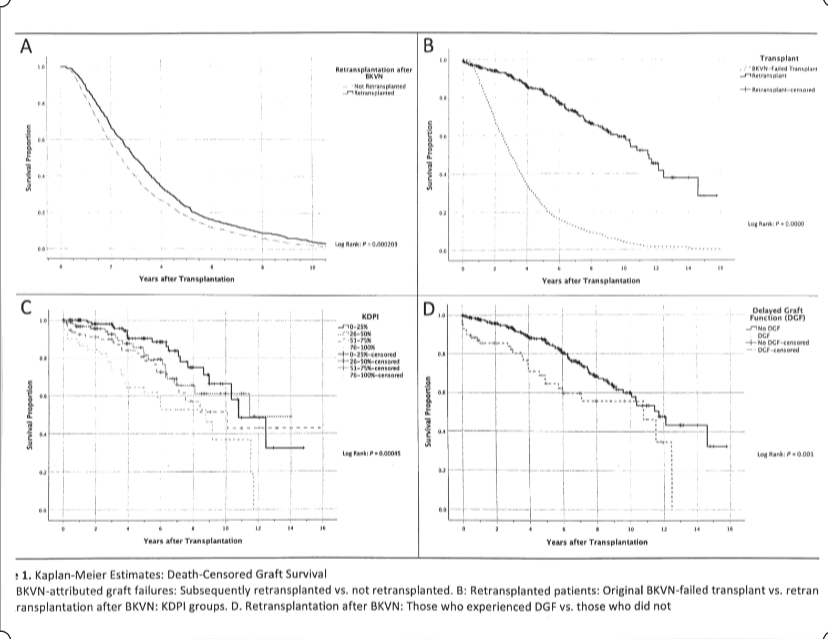Characterization of Retransplantation Following Graft Failure Due to Bkvn
1Surgery, Temple University School of Medicine, Philadelphia, PA, 2Surgery, Temple University School of Medicine, Philadephia, PA, 3Surgery, Temple University School of Medicine, Gladwyne, PA
Meeting: 2021 American Transplant Congress
Abstract number: 269
Keywords: Infection, Retransplantation
Topic: Clinical Science » Infectious Disease » Kidney: Polyoma
Session Information
Session Name: BK virus in Kidney Recipients
Session Type: Rapid Fire Oral Abstract
Date: Monday, June 7, 2021
Session Time: 6:00pm-7:00pm
 Presentation Time: 6:20pm-6:25pm
Presentation Time: 6:20pm-6:25pm
Location: Virtual
*Purpose: Immunosuppression following kidney transplantation allows for the reactivation of BK polyomavirus (BKV)- frequently implicated in graft dysfunction and failure. Although BKV Nephropathy (BKVN) was first described nearly fifty years ago, there is still inadequate understanding of the disease and a lack of specific therapies. For patients whose grafts fail due to BKVN, re-transplantation is a viable option that has not been extensively studied. This study further characterizes BKVN and subsequent re-transplantation in the most expansive population studied to date, geographically, temporally, and in magnitude.
*Methods: The OPTN/UNOS database was used to identify patients who received kidney or kidney-pancreas transplantations between October 1, 1987 and December 31, 2018 that resulted in renal allograft failure attributed to BKVN (n=1587). This population was further divided into those who underwent kidney re-transplantation (n=495) and those who did not (n=1092). Subject characteristics were summarized using means and standard deviations or frequencies and percentages, as applicable. Significance between groups was determined by independent samples t-tests and χ2 tests (α = 0.05.). Death-censored graft survival for various subgroups was estimated using Kaplan-Meier with Log-Rank to assess significance. All analysis was completed using SPSS Statistics 26
*Results: The cohort that was re-transplanted after BKVN failure was significantly younger and had fewer prior kidney transplants, lower EPTS scores at failure, lower rates of delayed graft function, and a greater proportion of living donors when compared to those who were not re-transplanted. Allograft lifespan prior to BKVN failure was significantly greater in the population that was re-transplanted than the population that was not. Among re-transplants, delayed graft function or high KDPI significantly decreased allograft lifespan. The re-transplanted allografts lasted significantly longer than the original grafts that had failed due to BKVN. Use of steroids for induction was found to have no significant impact on graft survival when compared to a steroid-free regiment.
*Conclusions: Trends in and characteristics of successful re-transplantation after BKVN-associated graft failure, using the largest population of this type to date affirms viability of treatment of patients who lose grafts to BKVN and of re-transplantation following BKVN-associated graft failure.
To cite this abstract in AMA style:
Nguyen K, Curtis H, Panichella J, Resweber H, Carlo ADi, Karhadkar S. Characterization of Retransplantation Following Graft Failure Due to Bkvn [abstract]. Am J Transplant. 2021; 21 (suppl 3). https://atcmeetingabstracts.com/abstract/characterization-of-retransplantation-following-graft-failure-due-to-bkvn/. Accessed February 23, 2026.« Back to 2021 American Transplant Congress

